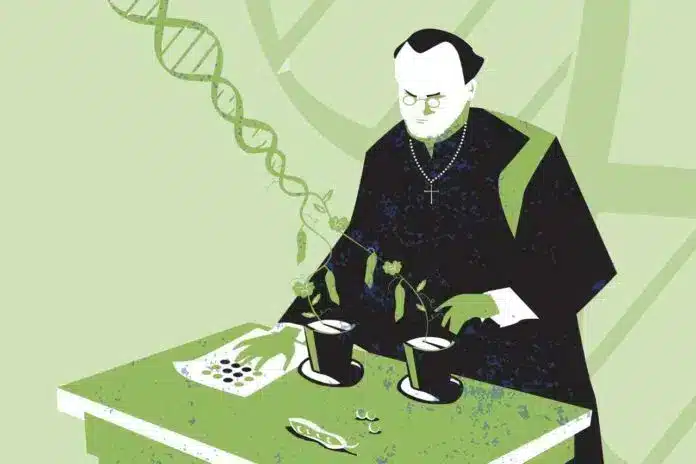On July 20, 2022, it will be 200 years since Gregor Mendel was born, and this is reason to celebrate!
Interesting fact: the ‘father of genetics’ did not start off with Gregor in its name, that came later on. But more on that in a bit. He was born as Johann Mendel in 1822 in a small village in the Austrian Empire. The Mendel family owned a small farm, and Johann spent his early years in a rural setting. His passion for plants and nature manifested itself early on, as he worked as a gardener and studied beekeeping in his childhood. Mendel joined the Faculty of Philosophy of University of Olomouc in the Czech Republic. He excelled in his studies, especially in physics and mathematics.
Instead of taking over the family farm, Mendel decided to be a monk, and he enrolled with the Augustinian Order of St Thomas in Brno, Moravia. It was here that he was given the name Gregor.
In 1854, the abbot allowed Gregor to conduct experiments on the transmission of hereditary characters in plants in the monastery’s two-hectare garden. Mendel choose to work on pea, for several reasons, one because there were many distinct varieties, but also because of the ease of culture and control of pollination. He looked at seven different characteristics in peas, including plant height, seed color and whether the seeds were wrinkly or smooth.
The genetic experiments for which he is so famous for, took him eight years (1856-1863), and during these years, Mendel grew over 10,000 pea plants, keeping track of various characteristics. He published his results in 1865, but unfortunately for Mendel, his work and his Laws of Inheritance were not appreciated in his time. It wasn’t until 1900, after the rediscovery of his Laws, that his experimental results were understood.
Through his work on pea plants, he discovered the fundamental laws of inheritance. He deduced that genes come in pairs and are inherited as distinct units, one from each parent. Mendel tracked the segregation of parental genes and their appearance in the offspring as dominant or recessive traits. He recognized the mathematical patterns of inheritance from one generation to the next. Mendel’s Laws of Heredity are usually stated as:
1) The Law of Segregation: Each inherited trait is defined by a gene pair. Parental genes are randomly separated to the sex cells so that sex cells contain only one gene of the pair. Offspring therefore inherit one genetic allele from each parent when sex cells unite in fertilization.
2) The Law of Independent Assortment: Genes for different traits are sorted separately from one another so that the inheritance of one trait is not dependent on the inheritance of another.
3) The Law of Dominance: An organism with alternate forms of a gene will express the form that is dominant.
And nowadays, whenever genetic traits follow the rules of inheritance that Mendel proposed, we call that Mendelian inheritance, no matter the organism.
Apart from his pea data that he presented, we must thank him for something else: his methodical hypothesis testing and applying mathematical models in a rigorous way to the study of biological inheritance. Based on his first experiments where plants differed in one characteristic, he then formed statistical predictions about how traits would inherit. Which he would then test in more complex experiments of plants that differed in two or more characteristics. This method of developing statistical expectations about inheritance data may be one of the most significant contributions Mendel made.
We now know that not all organisms pass on their genes in the same way as the garden pea. But many do indeed show similar inheritance patterns compared to the ones described by Mendel. To this day, scientists use Mendel’s principles to explain the most basic phenomena of inheritance.
It was through Mendel’s insights that we were able to greatly expand our understanding of the complexities of genetic inheritance. And that understanding led to the development of new experimental methods, more efficient plant breeding, and much better plant varieties.
Plant breeders all around the world will continue to develop higher yielding plant varieties, with better resistances to pests and diseases, higher nutritional content, drought tolerance, and much more.
I’m sure that in July 2022 there will be many celebrations for the ‘father of genetics.’ It is quite the milestone, and many will reflect on how important the understanding of genetics is, and how much progress we have made since then. It is safe to say that the impact Mendel’s teachings have had in the past two centuries can hardly be overestimated. As we have a myriad of challenges to stave off, the teachings of Mendel will continue to be direly needed for centuries to come.
Editor’s Note: This piece originally appeared on our sister publication’s website, European Seed.










